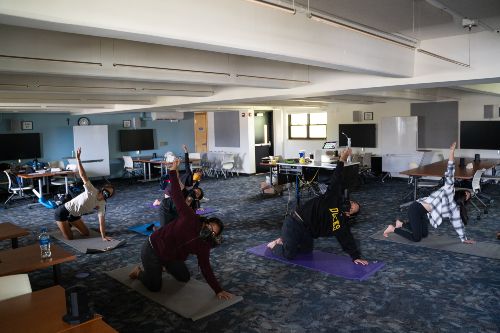In an innovative summer research institute, Chaminade students used data science to tackle big research questions.
For four intensive weeks this summer, 25 Chaminade students used supercomputers at the Texas Advanced Computing Center to analyze complex data sets. They were looking to test hypotheses to complex research questions. And along the way, they got valuable hands-on experience in data science, one of the nation’s fastest-growing fields in a long list of sectors, from climate science to healthcare.
The Alliance Supporting Pacific Impact through Computational Excellence (ALL-SPICE) Data Science Summer Institute allows students to take a deep dive into their research interests, giving them access to tools and supercomputers that can help synthesize complex data sets into understandable, manageable variables.
“This is not theoretical learning,” says Connor Flynn ’21, a data scientist with Chaminade’s School of Natural Sciences and Mathematics. Flynn participated in ALL-SPICE as a student and now serves as a group leader. “This is literally experiential since some of the students’ research projects require that they go to actual sites to verify what they’ve captured in their data is accurate.”
ALL-SPICE, now in its sixth year, is the product of an innovative Chaminade partnership with the University of Texas at Austin’s Texas Advanced Computing Center. ALL-SPICE is one of just four new National Science Foundation INCLUDES Alliances, and organizers say the ALL-SPICE program helps level the playing field for Native Hawaiian and Pacific Islander (NHPI) students, who are woefully underrepresented in science, technology, engineering and math (STEM) fields.
“The program is transformative for students from Hawaii and the US-affiliated Pacific, from Chaminade and many other colleges,” said Dr. Helen Turner, biology professor and principal investigator for Chaminade’s NSF ALL-SPICE program.
“Students come in with curiosity and a passion to solve their islands’ challenges. They leave as card-carrying data scientists with a high-demand skill set that they can use to change the future.”
Wilneris Carrion-Colon ’25 and Johnny Bae ’26 were among the students who participated in this year’s ALL-SPICE summer intensive program. They are both excited about pursuing careers in STEM.
In the summer program, the two Data and Computer Science majors used imaging technology to detect marine debris found off Windward Oahu. Carrion-Colon said satellite technology has become a valuable tool for detecting and classifying environmental phenomena on both land and aquatic environments.
“By analyzing reflectance and absorption of light, spectral bands enable machines to differentiate material classes,” said Carrion-Colon, during her final presentation.
“Notably, the Windward side was chosen because it is particularly susceptible to marine debris accumulation due to prevailing ocean currents.”
Carrion-Colon noted there are limitations to her analysis, but added that’s reason to do more research.
In his research, Bae mapped out ocean plastics using machine learning in waters northeast of Oahu.
Also using multispectral satellite imagery and statistical learning algorithms to detect floating marine debris, Bae sought to underscore the critical role of technology in environmental management.
“Ultimately, this work contributes to protecting marine ecosystems, supporting economic stability and safeguarding public health,” said Bae, in presenting his findings.
“Future research and initiatives—stemming from detecting and mitigating plastic marine debris in Hawaii’s ocean using machine learning and AI—can significantly contribute to the United Nations’ Sustainable Development Goals, specifically SDG 12, which focuses on responsible consumption and production; and SDG 13, which involves evaluating the carbon footprint of plastic debris.”
Open to all majors, from nursing and business to biology and interior design, the ALL-SPICE Data Science Summer Institute also teaches students how to code and use other cutting-edge tech.
Organizers say ALL-SPICE participants represent the region’s diversity, and include significant numbers of women and veterans. Students work in thematic areas that are of central importance to the Hawaii-Pacific region, including climate analytics, health inequity and the impacts of misinformation.
The summer institute also has a strong cultural component and culminates in a ho‘ike—a showcase of student projects). SPICE mentors include faculty, analysts and peers. To learn more, click here.
The SPICE program was funded by NSF INCLUDES ALL-SPICE Alliance #HRD-1744526. Student places were sponsored by ALL-SPICE and the following additional grants (Primary Investigator Dr. Helen Turner): NSF EPSCoR Hawaii (#OIA-2149133), the Pacific Intelligence Innovation Initiative, the Sullivan Family Foundation and NIH grant 3U54GM138062-03S1 (Primary Investigator Dr. Youping Deng, University of Hawaii).




















